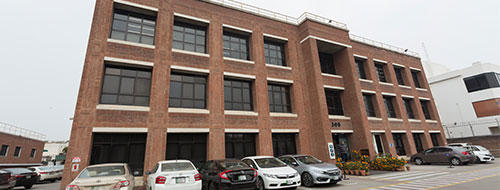Rural Development

Rural Development is our biggest area of focus. As part of our Rural Development programmes, we interact with communities, especially farmers, who are a part of our dairy value chain in Pakistan. Nestlé Pakistan is training dairy farmers and livestock workers to help them increase milk production and their income to ensure a better life.
1. Women Agri-preneurship in dairy sector:
Nestlé Pakistan is committed to invest in the lives of people associated with the rural dairy sector in Pakistan. Keeping in view the role of rural women in livestock management and the significance of their economic empowerment, Nestlé believes that capacity building trainings for rural women will help improve livestock, healthcare facilities for dairy farmers, create gender empowerment and boost income generation for rural communities.
Under this initiative in 2015, approximately 2,000 rural women were trained on adopting Best Farm Practices which include free access to water, appropriate feeding, awareness of best breeds and basic record keeping of a dairy farm etc. Moreover, 300 female milk suppliers were also made a part of Nestlé’s milk collection value chain.
One of these women whose life has been transformed is Razia Mukhtar from Okara. Razia lives with her husband and two daughters. When she got married, her husband had two buffaloes and was working at a local dhaba (restaurant). He was earning Rs 4,000 per month, which was not enough to run a family. Razia started taking interest in dairy farming with an aim to sell buffalo milk to contribute to her family income.
In 2015, Razia met Nestlé’s Dairy Development team in a female farmer training session. She invited the team to her home who convinced her to provide the animals with free access to water. Initially, her husband was reluctant but she persisted and he agreed. The Nestlé team renovated her shed and untied the animals to allow free roaming within her shed. Razia experienced an improvement in milk yield.
In her feedback, Razia stated: “My buffalo’s milk production increased from 7 litres to 8.5 litres per animal per day. Now I am getting an additional benefit of PKR 7,500 on average from improved milk sale. I have also saved on medical expenses of the animals as a result of their improved health and improved farm hygiene.”Commenting on the financial gain that Razia has experienced recently, she said, “Recently I have installed an electric water pump at my home that has enabled easy filling of the water trough. I have also upgraded the washroom by installing wash basin and water taps. My major saving is for the education of my daughters as I want to see them very successful in their lives.”
2. Rural School Training:
Another initiative taken by the Dairy Development team in 2015, was the Rural School Training Programme. The objective is to educate and sensitise our rural yout on better farming practices, basic concepts on road safety, water conservation and also to channelize these messages to the household level through children. In 2015, approximately 2,900 students were trained through this initiative, which also helped expedite the process of decision making and enabled a behaviour change in farming communities.
3. Farmer Help Camps:
Farmer Help Camps serve as a good platform to support and develop traditional dairy farmers in Pakistan.
Nestlé Pakistan has been conducting farmer help camps to support and improve farmer’s livelihoods for the last five years. Farmer help camps are organised regularly near Village Milk Collection Centres and also to help farmers when they face natural disasters such as floods.
In 2015, approximately 3,111 help camps were conducted, where over 80,340 farmers were trained on good agriculture practices.
4. Local Training Farms:
Nestlé selected five community-owned farms as Training Farms in 2015. These farms serve as success stories for small dairy farmers.
5. Enhancing Dairy Farm Efficiencies:
One of the key initiatives in Dairy Development was to support dairy farmers to reduce the cost of production to ultimately increase their profit margins. A majority of dairy farmers have high cost of milk production due to poor herd planning, feeding patterns and the inability of managing feed resources around the year.
In 2015, Dairy Development selected 300 Commercial Farmers to gauge the situation and create success stories, so that the farmers can see how small changes in management practices can bring about a significant difference in farm economics. Feeding was taken as the top priority, as nearly 80% cost of production is contributed by the animal feed. Individual farmers were supported with a feeding calendar with day-to-day planning on feed purchases and awareness sessions were conducted on alternate feed resources with the support of the Nestlé Dairy Development Executives. The selected 300 farmers reduced the overall cost of milk production just by managing the cattle feed.
One such success story is of Sardar Khan Khichi, who is one of the commercial dairy farmers residing in a small village named Sher Gher near Mailsi, district Vehari. Sardar Khan Khichi is a progressive farmer but he was facing the issue of high cost of milk production which was squeezing his profit margins day-by-day.
Nestlé’s Dairy Development team approached him and selected his farm to improve the situation and to present him as a success story for neighbouring farmers.
The major issue faced by Khichi at his farm was the use of unbalanced feed without proper planning of the herd’s feeds requirement. The Dairy Development team supported him by developing a complete feeding calendar with proper planning of feed requirements for the herd. This resulted in improved yields and profit margins for Khichi’s farm.
6. Water Conservation in Agriculture:
Availability of water per capita is decreasing drastically in Pakistan, with agriculture sector being the major consumer of water. Nestlé Pakistan is training farmers as part of good agricultural practices to enhance water productivity at their farms. About 1,100 farmers were introduced to low water requiring fodder varieties like ‘Alfalfa’ and ‘Rhodes’ grass.
Furrow irrigation (that saves around 20% water) was introduced for maize at Nestlé training farms for demonstration purposes. Drip irrigation was introduced at commercial dairy farms to promote water conservation. The trial of dry sowing of rice is being undertaken to save water and for reducing the arsenic content in rice grain.
7. High Quality Cattle Feed Development:
Aflatoxin is a serious threat to animal health. The main source of aflatoxin is the fungal contamination in cattle feed, which is developed mainly due to poor post-harvest practices. Nestlé Pakistan addressed the root cause by developing good quality cattle feed manufactures as well as their raw material suppliers by implementing good post harvest practices at field level as well as good manufacturing practices at the cattle feed mills. More than 29 feed mills have been developed with the technical support of Nestlé Pakistan to supply high quality feed to dairy farmers. It improves the animal health as well as the milk quality.
8. Commercial Farm Development Project:
Nestlé Pakistan, in collaboration with International Finance Corporation (IFC), initiated a project with the aim to increase fresh milk volume with good quality at selected commercial dairy farms. IFC will develop 200 commercial farms by enhancing the skill level of farmers and Nestlé extension workers. The activities will include the customisation of dairy expansion guidelines, access to finance and training

